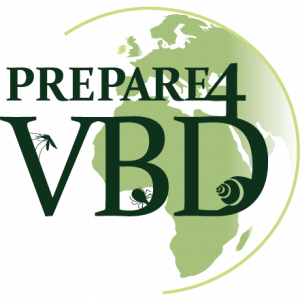The PREPARE press
Welcome to our blog, dedicated to the work of the Horizon 2020 EU-funded project PREPARE4VBD. Here, you’ll find updates on our ongoing activities and the latest progress in our experiments. We aim to share the excitement about the impact of our project as we strive to address the spread of vector-borne diseases in a warming world.
Direct PCR: A New Molecular Tool for Tick-Borne Disease Surveillance
Dennis Getange is PREPARE4VBD PhD fellow and a Phd Student in Biological Sciences at the University of KwaZulu-Natal, South Africa, conducting his research at the International Centre of Insect Physiology and Ecology (icipe), Kenya, within the Animal Health Department. His research focuses on understanding host-vector-pathogen interactions: the ways in which bacteria (pathogens) are transmitted by ticks (vectors) to animals or humans (hosts). He is also developing molecular tools for early detection and monitoring of tick-borne pathogens to improve disease surveillance and enhance the One Health approach to control diseases. He is currently working on one of his PhD objectives on developing new molecular tools for detection and monitoring of tick-borne pathogens.
Every year, diseases transmitted by ticks cost livestock farmers in East Africa tens of millions of dollars and threaten rural livelihoods and food security. Under the PREPARE4VBD consortium, we developed a direct molecular tool that circumvents the need for DNA extraction and could revolutionize regional surveillance of tick-borne pathogens by enabling faster, on-site detection of tick-borne pathogens.


The molecular technique we use here is the direct PCR-HRM analysis (polymerase chain reaction – high-resolution melting analysis), a powerful and increasingly popular method for the rapid and sensitive detection of pathogens. The direct PCR approach is performed directly on samples without prior DNA extraction and purification. After the PCR amplifies specific pathogen DNA, the High-Resolution Melting analysis steps begins where the amplified DNA heats up and denatures or “melts”, creating a unique melt profile. The specific Anaplasma and Ehrlichia species present in the samples are then accurately identified through comparing the melt profile of our samples (unknowns) to known pathogen profiles (positive controls).
The journey to conquer tick-borne diseases is far from over, but with innovative methods like direct PCR-HRM, we’re one step closer to real-time, field-based surveillance of tick-borne pathogens across East Africa.


Fellow Tiem van der Deure writes about his research stay at icipe
PhD student and PREPARE4VBD fellow Tiem van der Deure recently completed a 3-month research stay at project partner icipe in Nairobi. In today’s blog post, he writes about this experience.
“My research focuses on predicting the impacts of climate change on vector-borne diseases. Many of the diseases I study—such as schistosomiasis and malaria—disproportionately affect Africa. That’s why it was important for me to spend part of my PhD in an African country, to better understand the ongoing efforts to combat these diseases on the ground.
I had met colleagues from Icipe through PREPARE4VBD meetings, and as an institution with world-class research across all aspects of vector biology, icipe was the perfect place for a research stay.
I found icipe to be an incredibly stimulating research environment. The institute works on a wide range of topics, including animal and human health, agriculture, and food production. Different departments focus on data collection and surveillance, modeling, laboratory experiments, and the development of new molecular tools.
Icipe is also a very international place, with researchers from around the world collaborating with both local and global institutions. I was fortunate to meet some of these partners—for example, by presenting at a COMBAT workshop aimed at training researchers from KENTTEC, an organization working to eradicate trypanosomiasis in Kenya, and ARC-OVR, a South African veterinary research institute.”
(continues below)


“At icipe, there is a big focus on exchange of skills and knowledge. There is a student-organized online science club every Friday where students and researchers from icipe and abroad present their research. Visiting collaborators would often give seminars, which I found incredibly inspiring.
I also had the opportunity to visit one of icipe’s field stations near Mombasa, where colleagues were trapping tsetse flies. As a modeler, seeing how the data is generated in the field was a real highlight.
There are also many traditions at icipe that I will miss now that I am back in Denmark. On the last Friday of every month, all staff gather for an informal meeting with tea and snacks, where announcements are shared and everyone sings for those who had a birthday that month. I also joined the icipe football team, which was a great way to meet colleagues—and even took part in a tournament where we played against teams from other research institutions.”


PREPARE4VBD Project Concludes with Impactful Outreach in Uganda
From May 5th to 8th, 2025, the PREPARE4VBD project marked a significant milestone with its final consortium meeting and stakeholder engagement event in Entebbe, Uganda. Hosted by project partners Makerere University and Uganda’s Vector Control Division, the event highlighted the main results of four years of cross-continental collaboration under PREPARE4VBD.
During the event, all 10 project partners presented key messages to participating stakeholders, including representatives from the Ministries of Health and Agriculture. Multiple partners emphasized the need for improved surveillance of vector species in the face of climate change. To help do so, partners presented innovative tools developed under PREPARE4VBD – ranging from sensitive diagnostics to early warning systems.
Dr. Allan Muruta, Commissioner for Epidemiology Surveillance and Public Health Emergencies, pledged to integrate the tools and findings from the PREPARE4VBD project into Uganda’s national disease surveillance systems to strengthen the capacity for detection and responding to vector-borne disease outbreaks. This pledge underscores PREPARE4VBD’s impact and its alignment with the One Health approach, bridging human, animal, and environmental health.
The event received widespread media attention from local and national media outlets.
On the final day of the meeting, the consortium members visited Makerere University in Kampala, where PREPARE4VBD researchers engaged with Prof. Frank Mwiine, Dr. Robert Tweyongyere, students, and researchers to discuss vector-borne diseases. The program ended with a panel discussion on how to integrate One Health approaches in university curricula, which included consortium members Prof. Mahama Touré (University AO Bouaké, Côte d’Ivoire), Prof. Moses Chimbari (University of KwaZulu-Natal, South Africa) and Prof. Lawrence Mugisha (Makerere University, Uganda).





Guest post by PhD student Lembris Laanyuni Njotto
Lembris Laanyuni Njotto, a PhD student in mathematical and statistical modeling at the University of Dar Es Salaam in Tanzania, recently completed a 2-month research stay at the University of Copenhagen, where he interacted with the PREPARE4VBD team. In this guest blog post, Lembris tells about his experience as an exchange student in Copenhagen.
“I’m Lembris Laanyuni Njotto from Tanzania. I am passionate about leveraging advanced statistical and machine learning techniques to analyze complex ecological and health datasets. Currently, I am working on developing and improving predictive models for the spread of vector-borne diseases, particularly malaria and dengue.
The link between climate and disease transmission is essential because climate factors such as temperature, rainfall, and humidity directly influence the behavior and survival of disease vectors like mosquitoes. By understanding these relationships, we can predict outbreaks of these diseases with greater accuracy. We use different kinds of statistical models to accomplish this. The ultimate goal is to create a predictive surveillance system that provides alerts to public health authorities, enabling them to act proactively in mitigating disease transmission and reducing the public health burden.
At the start of my recent 2-month stay in Denmark, I immediately noticed how different the work culture is compared to Tanzania. In Denmark, the work environment is both well-organized and flexible, with a big focus on work-life balance and giving people the freedom to manage their tasks. I was especially struck by the flat structure in workplaces, where everyone, no matter their position, is encouraged to share ideas and work together openly.
My stay in Denmark has significantly contributed to my professional growth and development. An important milestone during my time in Denmark was finalizing one of my publications, which has now been accepted for publication in PLOS Neglected Tropical Diseases.“
Read Lembris’ paper on Quantitative modelling for dengue and Aedes mosquitoes in Africa here.


Left: Lembris with the PREPARE4VBD team at the section for Parasitology and Pathobiology, University of Copenhagen. Right: Lembris at Louisiana Museum in Denmark.
2024 - PREPARE4VBD - wrapped
It has been quite the year for PREPARE4VBD! We are officially into the final year of the project (three of four) and are expecting a lot of big things in 2025! But for now, check our ‘Prepare4VBD wrapped’ below to see all that has been achieved by the end of 2024.


















For more information on some of the tools/techniques we used, visit our ‘Training materials’ page, and for other updates on our ongoing research, recent publications, and insights into our research fellows, read the full newsletter [here ->].

